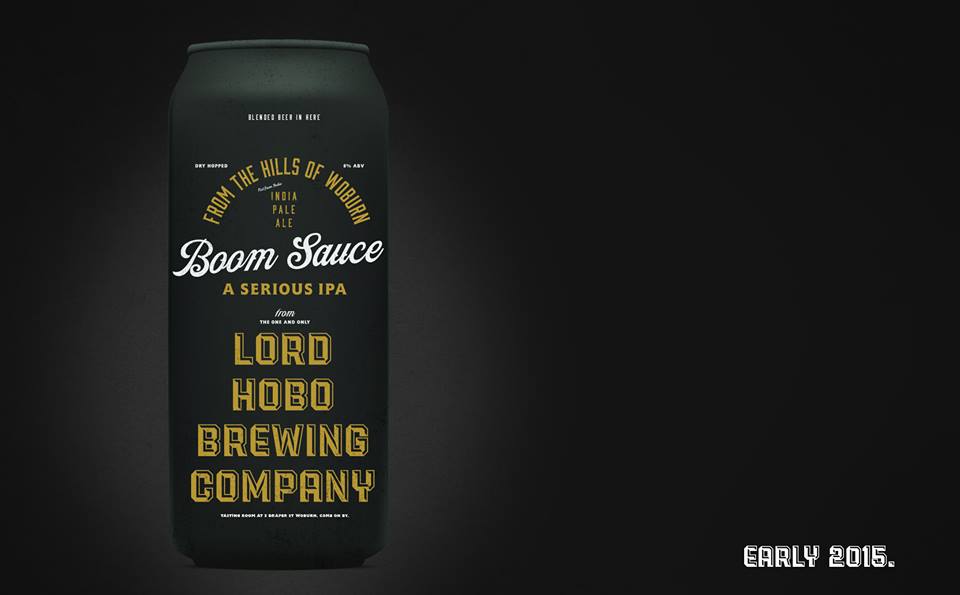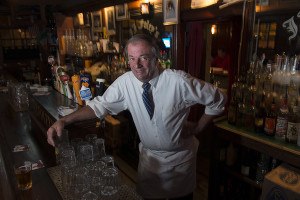Brace Yourself for Boom Sauce, a New IPA from Lord Hobo

Artwork via Lord Hobo Brewing Company/Facebook
Nobody could ever fault Lord Hobo owner Daniel Lanigan for lack of ambition. After 12 years of building some of the best beer bars in Boston, New York, and Baltimore, the opinionated publican is opening his own brewery in a 47,000 square foot space in Woburn—a massive facility that’s capable of producing 10,000 barrels (315,000 gallons) annually. For a fledgling operation, that’s almost unheard of. In fact, Lanigan will be the first one to tell you that it has never been done before. But that’s the goal when the craft beer maven makes the difficult jump from bar mogul to brewer come this March.
The aptly named Lord Hobo Brewing Company, located at 5 Draper Street in Woburn, will feature a range of beers, all of which will share one common attribute: hops. And lots of them. Lanigan says that by the end of 2015, Lord Hobo Brewing will release as many as 10 canned offerings, several of those being India Pale Ales, including its signature product, Boom Sauce. But there will also be a five-barrel test batch system for brewery-only, small production rarities, and a barrel-aging room for a sour line of beers, some of which will defy the typical bounds of dry hopping. Inspired by a recent trip to Trinity Brewing in Colorado Springs, Colorado, Lord Hobo is experimenting with sour IPAs, something Lanigan says he’s particularly excited about.
“We’re going to be brewing lots of beers and lots of different styles, but our initial rollout will primarily be hoppy ales,” Lanigan says. “I think the term IPA is tired and overused, so I prefer to think of Lord Hobo as a hop-forward brewery. Our intention is to have four beers available the day we open and expand from there. We’ll have several different IPAs that’ll all be distinctive, we’ll also be rolling out dry and hoppy saisons, and even a stout. I’m not a big stout guy because I think so many of them are lame, but our head brewer Vince [Tursi] has convinced me that he can make a kick-ass one. So, he’s making one and if it is great, we’ll sell it. And if it’s not, I’ll throw him in the tank.”
Wisely, the first time brewer has surrounded himself with some of the city’s top beer talent in order to hit the ground running. Heading up the Lord Hobo team is the aforementioned Tursi, most recently of Night Shift Brewing in Everett, cellar operator David Kushner, formerly the head cellarman at Harpoon, and brewer-engineer Michael Labbe, who left Somerville’s Aeronaut to join the Lord Hobo concept.
“We have a really good team,” Lanigan says. “Vince is a superstar in the making. I think he is an idiot savant, emphasis on the savant. Just the way he approaches beer and analyzes how it’s made—he’s a forward thinker that studies his craft relentlessly. I think some of the beers he made at Night Shift were excellent, and he was very persuasive. There’s a lot of people eager to work here. It’s a unique setup with 47,000 square feet and a four-vessel, 40-barrel brewhouse, which is quite large.”
In addition to the brewing space, Lord Hobo will have room for a retail area and a 4,000 square foot taproom that will be able to accommodate 400 visitors. Lanigan says there will be 15 draft lines, 12 of which will be dedicated to a rotating cast of beers. Out of the remaining few taps, one will feature cold brew coffee supplied by new roastery Share out of Amherst. The all-in-one aspect of the brewery—with shopping, a bar, growler fills, and commercial brewing on-site—is something Lanigan is modeling after the much-heralded Three Floyds brewpub in Indiana.
And as to the quality of the beer? Lanigan is confident. In fact, he foresees problems at his own bars, where he thinks patrons will gravitate to the Lord Hobo offerings, leaving the remaining 35-40 draft lines to spoil with neglect.
“It’s a delicate scenario,” Lanigan says. “We have 44 tap lines, but only 85 seats in the restaurant. It’s a lot of beer to keep fresh. We’re busy all the time, so it’s never been a problem, but I am aware that in the first couple months, the curiosity factor is going to be high. I think most people are likely going to want to try our beers over stuff they might have had a couple times. I don’t want to be cocky and say people are only going to want to buy our beer. The most important thing is whether or not the liquid is good. Our job is to make world-class liquid. If we do that, we probably won’t sell much else.”
While waiting for their Certificate of Occupancy from the City of Woburn, the last bit of certification needed before they can complete construction on the facility, Lanigan has taken his team on trips to Colorado, Chicago, and all the way up and down New England to visit breweries, sample beer, and generally study the habits of the most successful operations. They hope that additional effort and research will lend itself to building a brewery that can compete with anyone else in the country.
“I never realized how enjoyable it would be to actually make something,” Lanigan says. “Before, the creative impulses I had were always satisfied by building new bars. I built six of them from scratch. So the process of putting together this brewery, from the equipment to the people involved—and now we’re brewing up test batches that are turning out great—has been incredible. I’m learning a skill I’m obviously very passionate about. Craft beer has been my life for better or worse, and now I get to make it. If I had know how satisfying it would be to build a brewery and make beer, I would have done this a long time ago.”


